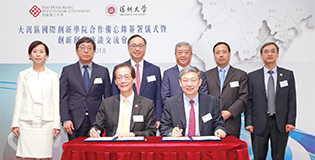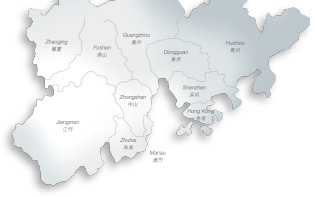
PolyU’s latest joint initiative with Shenzhen University strives to nurture innovative technology talents, advance technology and innovation, and incubate high-tech entrepreneurs in the Greater Bay Area.
In 2016, the nation unveiled its blueprint for the development of the Greater Bay Area (GBA) in its 13th Five Year Plan, linking Hong Kong with Macau and nine cities in southern China to form an integrated economic and business hub. In support of this new initiative, PolyU has developed plans to advance the development of the GBA, leveraging the University’s competitive advantages in innovation, entrepreneurial development and industrial network.
Having established a network for knowledge exchange with various mainland institutions over the years, PolyU has already done much to strengthen the ties between Hong Kong and mainland China for the greater good. Shenzhen University (SZU) is one of our partnering institutions and we work together on various educational and innovation initiatives to foster a “do well, do good” entrepreneurial culture.

PolyU President Prof. Timothy W. Tong (front left) and SZU President Prof. Li Qing-quan (front right) sign a Memorandum of Understanding to jointly establish The Greater Bay Area International Institute for Innovation.
This year, the two institutions have taken their collaboration to another level by signing a Memorandum of Understanding on the joint establishment of the Greater Bay Area International Institute for Innovation, which is set to transform the GBA into a world-class innovation hub. Partnering with other renowned institutions and enterprises worldwide, PolyU and SZU will leverage their strengths in knowledge transfer and innovation to create a platform for nurturing talent in innovative technology and incubating high-tech entrepreneurial ventures, benefitting our economy and society.
Innovation is a key driving force for development, and the work of the Institute will inject fresh vitality into the nation’s strategy for boosting the region’s competitiveness. Testament to the far-reaching significance of this synergy of resources and expertise, the historic signing ceremony held on 18 July, was witnessed by government officials and representatives of tertiary education and industry sectors in Hong Kong and Shenzhen.

The University’s innovative space resources at PolyU Shenzhen Base (left) and on PolyU campus (right).
Prof. Timothy W. Tong, PolyU President, and Prof. Li Qing-quan, President of SZU, are keenly aware that the Institute’s support for business, industry and government must also meet the needs of society. PolyU and SZU will first jointly organise entrepreneurial training camps and open up their resources for mutual use – sharing not only innovation spaces, but also access to their world-class innovation and entrepreneurship programmes.
In the short term, the universities will also establish a Lean Launchpad Plus programme to cultivate techno-entrepreneurship in the GBA. This support for the commercialisation of research innovation in the region will later be boosted by a Technology Transfer Go-to-Market and Scale-up Platform, leveraging the industrial network and resources of PolyU, SZU and Shenzhen to enhance the competitiveness of the GBA.
Over time, the impact of the Institute will be felt worldwide. Jointly established entrepreneurship education programmes will facilitate exchange between the Chinese mainland and innovation communities worldwide, particularly the three major Bay Areas in San Francisco, New York and Tokyo. By bringing in talented researchers, innovators and investors from all over the world to participate in its pioneering innovation activities, the Institute will help to promote the internationalisation of the GBA.♦

